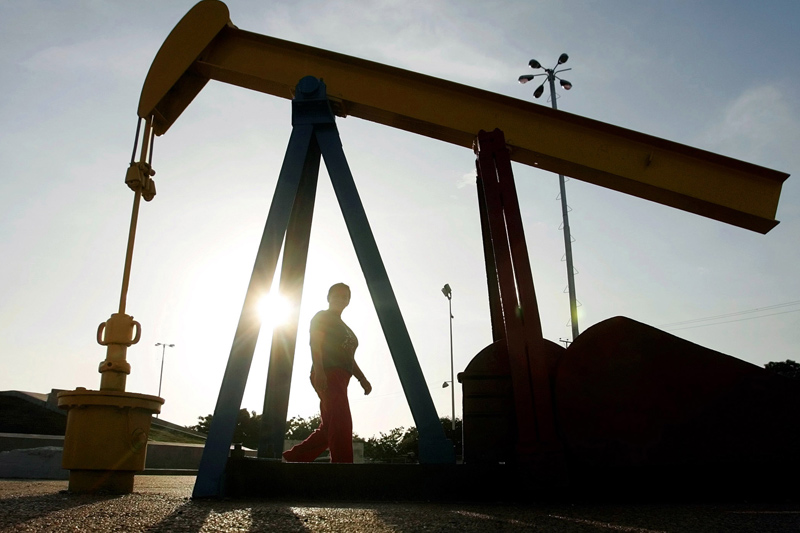* AstraZeneca says COVID-19 vaccine can be 90% effective
* Trump, officials give nod to formal Biden transition
* OPEC experts meet ahead of next week's crucial gathering
* Coming up: API inventory data at 2130 GMT
By Jessica Jaganathan
SINGAPORE, Nov 24 (Reuters) - Oil prices held gains on
Tuesday as news of a third promising vaccine candidate spurred
hopes of a quick recovery in oil demand, while U.S.
President-elect Joe Biden received the go-ahead to begin his
presidential transition.
Brent crude futures LCOc1 rose 3 cents, or 0.1%, to $46.09
a barrel by 0113 GMT, while U.S. West Texas Intermediate crude
CLc1 added 11 cents, or 0.3%, to $43.17 a barrel. Both
benchmarks settled up about 2% on Monday after gaining about 5%
last week.
"Oil prices are consolidating near three-month highs after a
third successful coronavirus vaccine trial, better-than-expected
flash PMI readings across Europe and the U.S.," said Edward
Moya, senior market analyst at OANDA.
AstraZeneca AZN.L said on Monday its COVID-19 vaccine was
70% effective in pivotal trials and could be up to 90%
effective, giving the world's fight against the global pandemic
a third new weapon that can be cheaper to make, easier to
distribute and faster to scale-up than rivals. This follows positive trial results from Pfizer/BioNTech
and Moderna.
Uncertainties surrounding U.S. post-election disputes also
started clearing after President Donald Trump on Monday allowed
officials to proceed with a transition to President-elect Joe
Biden, giving his rival access to briefings and funding even as
he vowed to persist with efforts to fight the election results.
U.S. crude oil inventories likely edged lower last week,
while distillate stockpiles were seen decreasing for a 10th
straight week, a preliminary Reuters poll showed on Monday.
The poll was conducted ahead of reports from the American
Petroleum Institute on Tuesday and the Energy Information
Administration (EIA) on Wednesday.
Traders also focused on a week of technical meetings by OPEC
and its allies to prepare the ground for next week's ministerial
gathering, which is set to discuss extending oil output curbs
into next year due to weak demand amid a second wave of
COVID-19.
- English (USA)
- English (UK)
- English (India)
- English (Canada)
- English (Australia)
- English (South Africa)
- English (Nigeria)
- Deutsch
- Español (España)
- Español (México)
- Français
- Italiano
- Nederlands
- Português (Portugal)
- Polski
- Português (Brasil)
- Русский
- Türkçe
- العربية
- Ελληνικά
- Svenska
- Suomi
- עברית
- 日本語
- 한국어
- 简体中文
- 繁體中文
- Bahasa Indonesia
- Bahasa Melayu
- ไทย
- Tiếng Việt
- हिंदी
Oil holds near 3-month highs as vaccines stoke demand recovery hopes
Published 11/24/2020, 09:49 AM
Updated 11/24/2020, 09:50 AM
Oil holds near 3-month highs as vaccines stoke demand recovery hopes

Latest comments
Install Our App
Risk Disclosure: Trading in financial instruments and/or cryptocurrencies involves high risks including the risk of losing some, or all, of your investment amount, and may not be suitable for all investors. Prices of cryptocurrencies are extremely volatile and may be affected by external factors such as financial, regulatory or political events. Trading on margin increases the financial risks.
Before deciding to trade in financial instrument or cryptocurrencies you should be fully informed of the risks and costs associated with trading the financial markets, carefully consider your investment objectives, level of experience, and risk appetite, and seek professional advice where needed.
Fusion Media would like to remind you that the data contained in this website is not necessarily real-time nor accurate. The data and prices on the website are not necessarily provided by any market or exchange, but may be provided by market makers, and so prices may not be accurate and may differ from the actual price at any given market, meaning prices are indicative and not appropriate for trading purposes. Fusion Media and any provider of the data contained in this website will not accept liability for any loss or damage as a result of your trading, or your reliance on the information contained within this website.
It is prohibited to use, store, reproduce, display, modify, transmit or distribute the data contained in this website without the explicit prior written permission of Fusion Media and/or the data provider. All intellectual property rights are reserved by the providers and/or the exchange providing the data contained in this website.
Fusion Media may be compensated by the advertisers that appear on the website, based on your interaction with the advertisements or advertisers.
Before deciding to trade in financial instrument or cryptocurrencies you should be fully informed of the risks and costs associated with trading the financial markets, carefully consider your investment objectives, level of experience, and risk appetite, and seek professional advice where needed.
Fusion Media would like to remind you that the data contained in this website is not necessarily real-time nor accurate. The data and prices on the website are not necessarily provided by any market or exchange, but may be provided by market makers, and so prices may not be accurate and may differ from the actual price at any given market, meaning prices are indicative and not appropriate for trading purposes. Fusion Media and any provider of the data contained in this website will not accept liability for any loss or damage as a result of your trading, or your reliance on the information contained within this website.
It is prohibited to use, store, reproduce, display, modify, transmit or distribute the data contained in this website without the explicit prior written permission of Fusion Media and/or the data provider. All intellectual property rights are reserved by the providers and/or the exchange providing the data contained in this website.
Fusion Media may be compensated by the advertisers that appear on the website, based on your interaction with the advertisements or advertisers.
© 2007-2025 - Fusion Media Limited. All Rights Reserved.